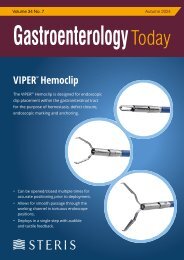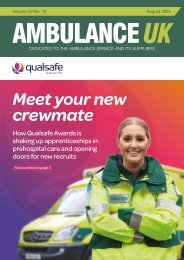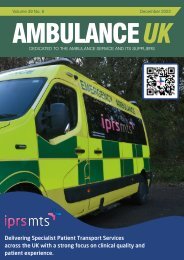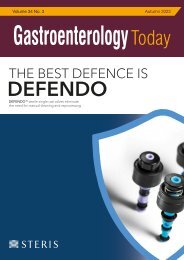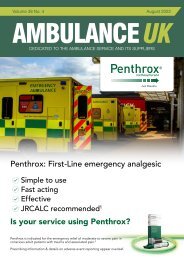Ambulance UK April 2021
Ambulance UK April 2021
Ambulance UK April 2021
Create successful ePaper yourself
Turn your PDF publications into a flip-book with our unique Google optimized e-Paper software.
FEATURE<br />
when reflecting from being ‘on the road’ with friends and colleagues, to<br />
being in a managerial position, contemplating: What happens to those<br />
collegial friendships and relationships once a paramedic is promoted<br />
to a management position? Does working within management affect<br />
the way other paramedics relate to their former peer? This study was<br />
designed to explore these contemplations, to delve into the experiences<br />
of paramedics who have transitioned from clinicians to managers, and<br />
gain insight into the perceived challenges which may have been faced<br />
during this change of role.<br />
Ethics approval<br />
Ethical approval was sought and granted from the Murdoch University<br />
Human Research Ethics Committee (#2020-023). In-principle support<br />
was also gained from the organisation prior to commencement of<br />
the study. The principal ethical considerations in this research was to<br />
protect and provide anonymity of the participants who had taken part in<br />
the study. Confidentiality was maintained, no coercion was entered, and<br />
there were no repercussions towards the potential participants who did<br />
not respond. The researcher approached all potential participants via<br />
email to ask if they wanted to take part in the study. The email included<br />
an information and consent letter. The participants were offered the<br />
option to be audio-recorded or not and informed consent was sought.<br />
Where during data analysis there were idioms of speech present,<br />
these were removed to protect identity, and participants were allocated<br />
numbers to further assist with de-identification. None of the participants<br />
required the assistance of the organisation’s wellbeing and support<br />
team during the interview process, although this was available to them.<br />
Information was gleaned during the interviews to provide subject matter<br />
expert replies to the interview questions and for no other purpose (8).<br />
Methods<br />
Research design<br />
A qualitative descriptive approach was used to explore the experiences<br />
of paramedics transitioning from clinician to manager (9). This<br />
methodology was applicable to support the research question and<br />
gain a deeper understanding of the topic (10). This approach allowed<br />
participants the opportunity to describe, in their own words, their own<br />
experience of transition (11).<br />
Participants, data collection and analysis<br />
Purposeful sampling of paramedics who have transitioned to manager<br />
were sought for semi-structured interviews. This allowed flexibility and<br />
deeper exploration of the subject matter from those who have had direct<br />
experience of this transition (12). Sampling occurred across different<br />
areas to capture those in differing managerial roles such as operations,<br />
executive, frontline and non-operation.<br />
There were N=14 managers approached to take part in the study from<br />
one paramedic setting. Ten (n=10) consented to participate and were<br />
interviewed. One interview did not record due to a technical issue and<br />
was not re-conducted due to additional COVID-19 pandemic workload<br />
for both the participant and the interviewer (13). Participants were<br />
aged between 30 and 55 years and had varying lengths of service,<br />
as both paramedics and managers, ranging from 10 to 25 years. The<br />
participants were purposefully selected as they were paramedics who<br />
had transitioned from clinician to manager and had requisite knowledge<br />
of the role-transition experience.<br />
Six semi-structured interview questions (devised from the literature)<br />
included questions concerning training, formal qualifications,<br />
experiences of transitioning to a manager role, and how this transition<br />
made the participants feel. The interviews lasted less than an hour and<br />
were undertaken at a mutually agreed time and place. Participants were<br />
able to withdraw from the study up until the end of data collection and<br />
before analysis being undertaken.<br />
Thematic analysis was undertaken to identify the key themes within<br />
participant responses by three qualitative reviewers. Thematic analysis<br />
was undertaken following the steps of familiarisation of the data,<br />
generating codes, searching for themes, reviewing and naming the<br />
themes, and writing up of the final report. Final themes were identified<br />
through discussion and regular consultation between the three<br />
researchers. The researchers utilised Microsoft Word DocTools software<br />
to assist with the data analysis and help to create themes (14).<br />
Findings<br />
Nine (n=9) interviews were conducted in one paramedic setting.<br />
Demographic data can be seen in Table 1. There were no participants<br />
from any recognised minority groups. Six major themes emerged<br />
from the data: ‘in at the deep end’, ‘lost your identity’, ‘sold your soul’,<br />
‘desirable rather than essential’, ‘street cred’ and ‘stand back and take a<br />
breath’. Each be discussed in turn.<br />
Table 1. Demographics<br />
Gender<br />
Female<br />
3<br />
Male<br />
6<br />
Age (years) 30-55<br />
Length of service range 10-25<br />
Position<br />
Operations manager 3<br />
Frontline manager 2<br />
Non-operations manager 2<br />
Senior executive 2<br />
Theme 1: In at the deep end<br />
Participants’ narratives concerning any management training before<br />
transitioning from frontline to management demonstrated the complexity<br />
of role transition and their feelings of being ‘thrown in at the deep end’.<br />
All participants were united in their descriptions of the lack of formal<br />
training before their role transition from clinician to manager.<br />
“There hasn’t really been any training prior to stepping<br />
back from the paramedic side of things.” Participant 6<br />
“So, my transition was a little bit in the deep end. The<br />
transition to the actual job was difficult.” Participant 9<br />
Theme 2: Lost your identity<br />
A question relating to the personal experience of transition from clinician<br />
to manager raised the most concern from participants and their feelings<br />
of isolation once they moved from the frontline role. The following<br />
AMBULANCE <strong>UK</strong> - APRIL<br />
Do you have anything you would like to add or include in Features? Please contact us and let us know.<br />
41



